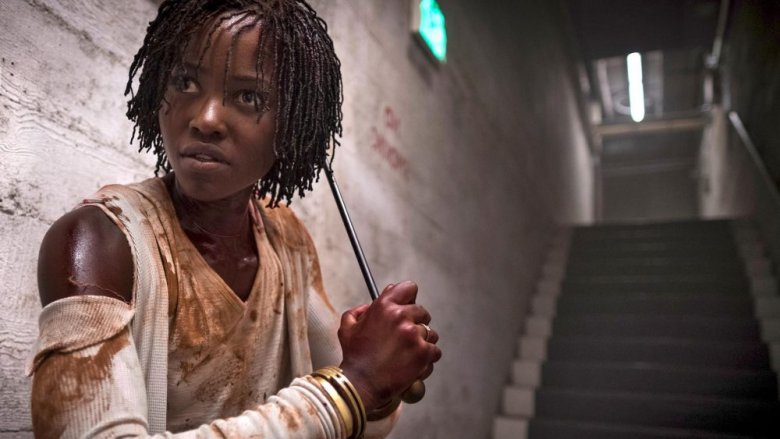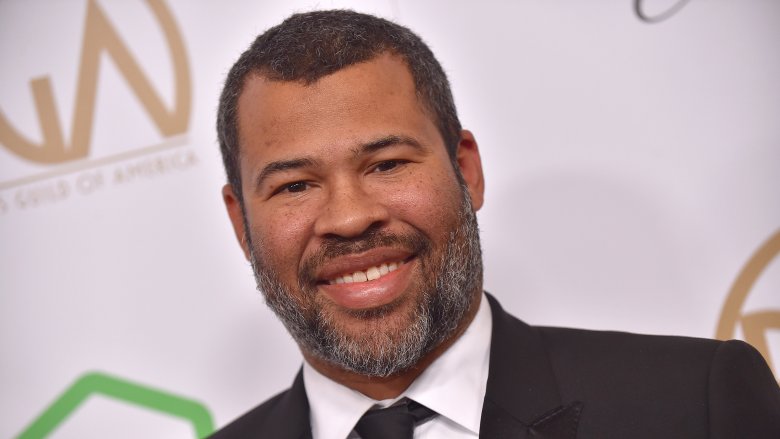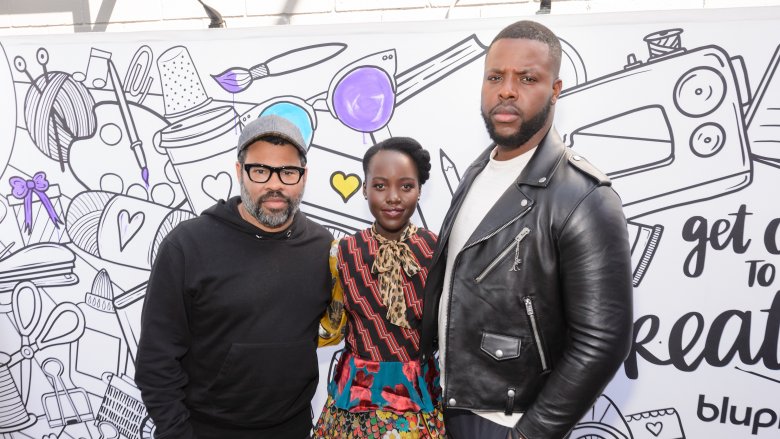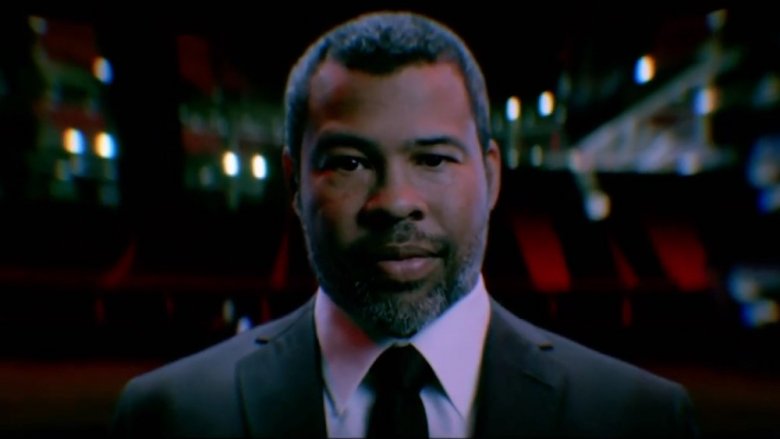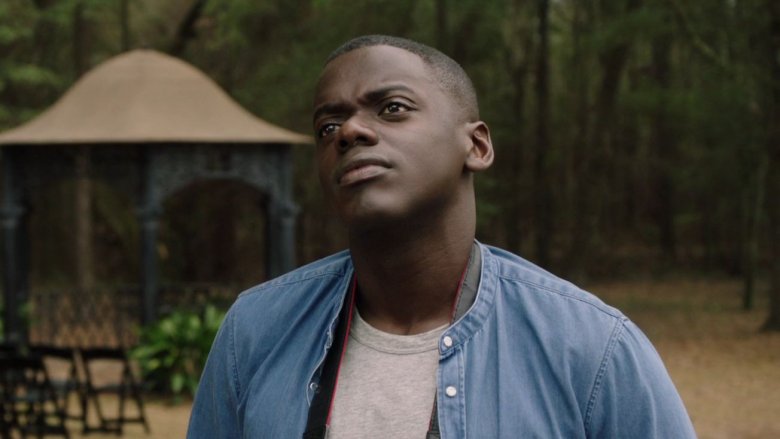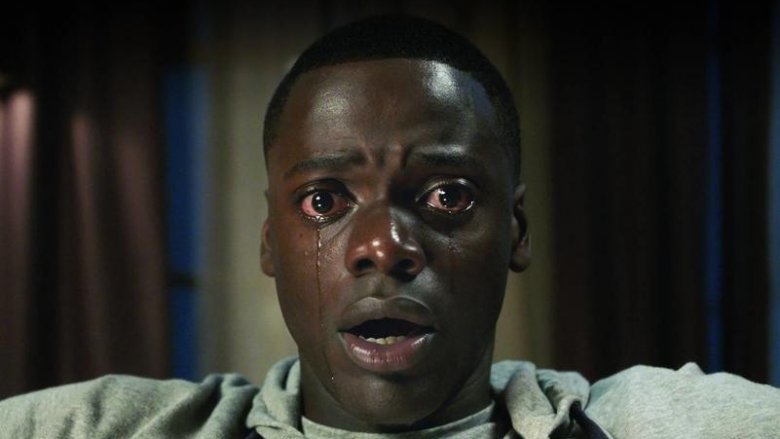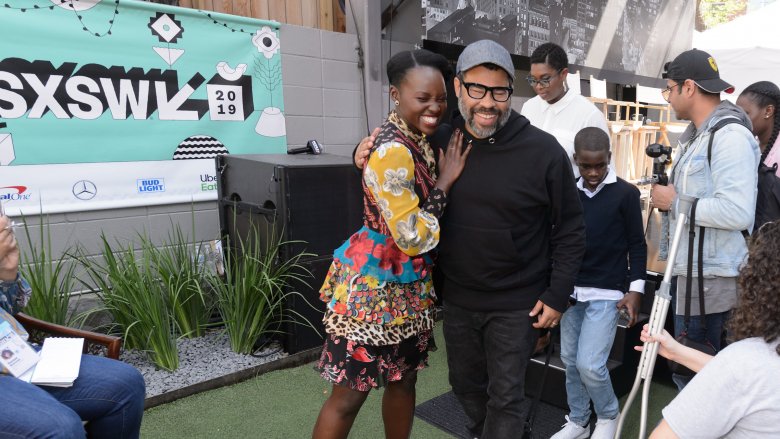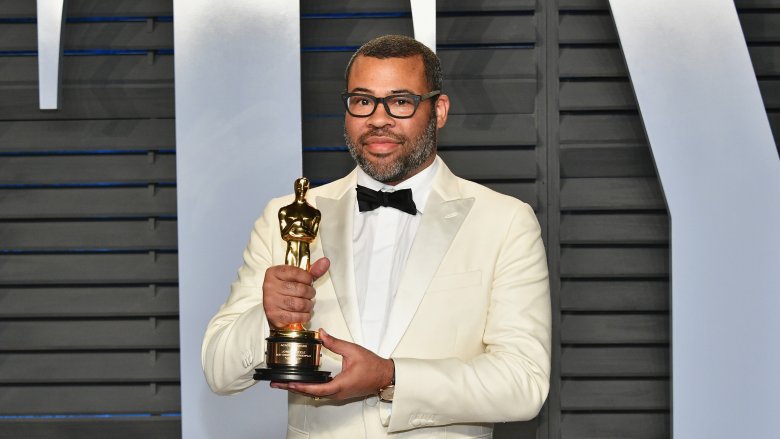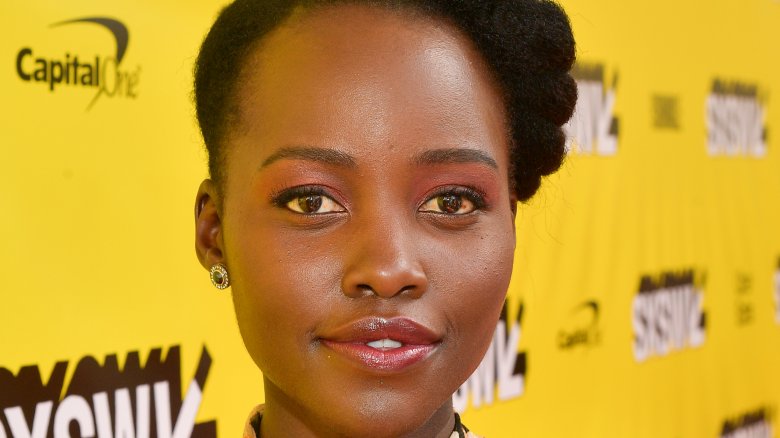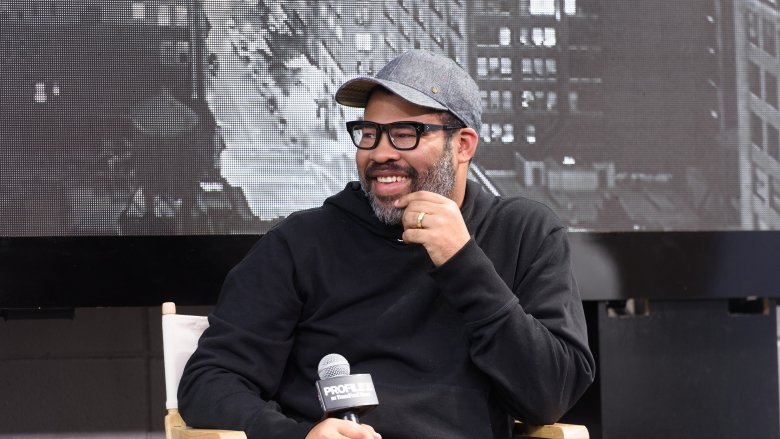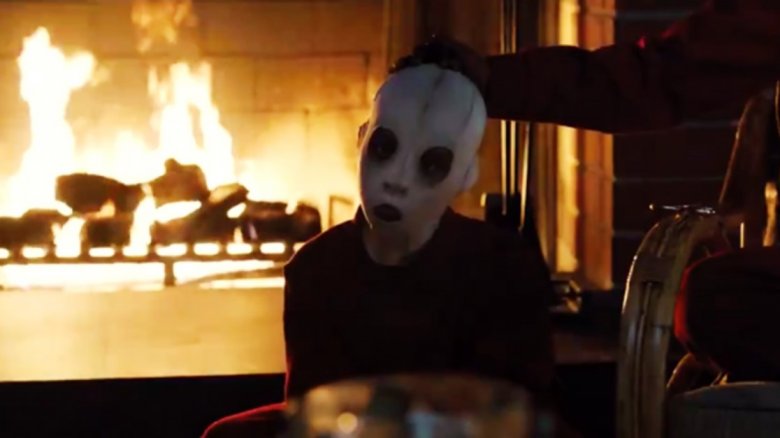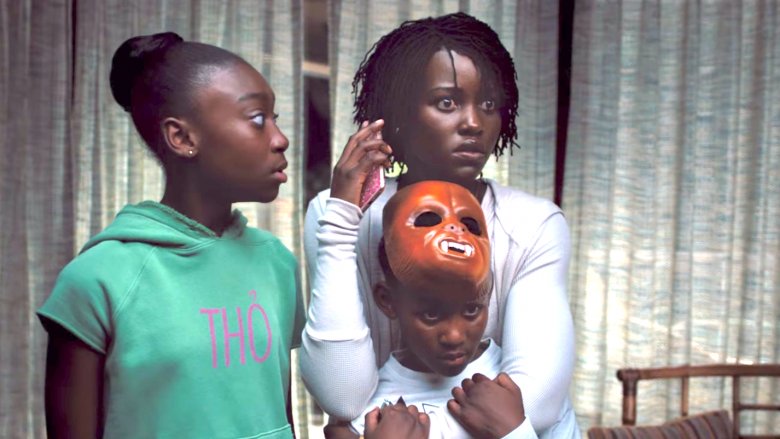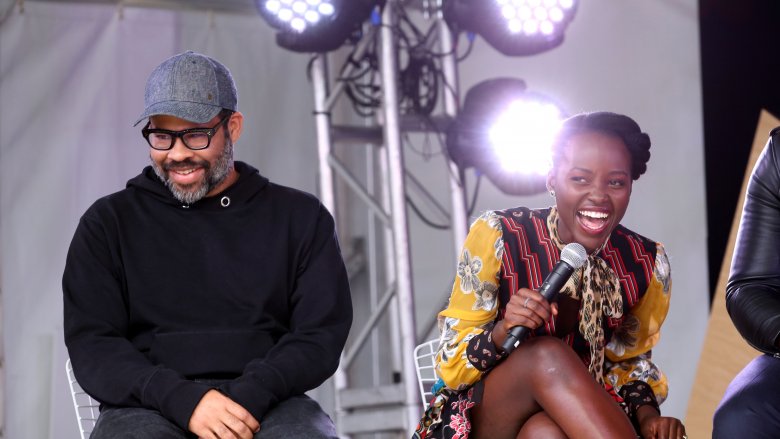Read This Before You See Us
On Christmas Day 2018, director, writer, and actor Jordan Peele gave audiences the best gift of all — the first full-length trailer for Us, the highly anticipated follow-up to his stunning debut film Get Out. Fans immediately started dissecting the footage, wondering what fresh frights Peele had in store for his sophomore outing — and getting excited for yet another beautifully directed, well-written film from the mind of this incredibly accomplished comedian turned Oscar winner.
Before you head to theaters to catch Peele's second movie, there's plenty you'll want to know — after plumbing the depths of Get Out since its release in 2017, fans will surely want to do the same for Us. From behind the scenes bon mots to how the film might even be connected to Get Out and early prognosticating for its Oscar chances, here's what you need to know before you see Us.
Peele's journey
After getting his start on the sketch comedy series Mad TV, where he spent five seasons, it might have seemed unlikely that Jordan Peele would soon shoot to the upper echelon of filmmakers and earn himself an Academy Award, but once audiences got to see his whip-smart social satire on Key & Peele, the hit sketch show starring Peele and his comedic scene partner Keegan Michael Key, they may have realized what a bright future Peele had ahead of him. From his pitch-perfect Obama impression (alongside Key's Luther, Obama's "anger translator," who ended up performing with the 44th President himself) to his enthusiastic valet and Meegan, Peele quickly made his mark on sketch comedy before setting his sights even higher.
Peele's 2017 film Get Out, chronicling an extremely bad weekend away for Chris (Daniel Kaluuya) at his white girlfriend's family's country house, ended up making its mark as the most profitable film of the year as well as netting an Academy Award for Best Original Screenplay for Peele (making him the first black screenwriter in history to win this award) along with nominations for Best Director and Best Picture. Peele has since retired from acting, noting that he prefers directing, but word is that he hasn't changed despite moving behind the camera — he brought his Obama impression back, among others, to lighten the mood on set during Get Out.
An incredible ensemble
After Get Out, which paired veteran actors like Bradley Whitford and Catherine Keener alongside lesser-known performers like Daniel Kaluuya and Allison Williams, Peele had to assemble a noteworthy cast for his second film, and he certainly didn't disappoint. Two of the first names announced were Winston Duke and Lupita Nyong'o, the former of whom is known for roles in Person of Interest and other small film and television roles while the latter made an unforgettable debut in Steve McQueen's 12 Years a Slave while she was still attending Yale Drama School and even won an Academy Award for her work. The two actors also notably appeared together in 2018's Black Panther, the juggernaut Marvel superhero film starring Chadwick Boseman and Michael B. Jordan that crushed box office records.
Aside from Duke and Nyong'o, the film features two other stars familiar to TV fans: Elisabeth Moss and Tim Heidecker, who are known for vastly different projects. Elisabeth Moss rose to fame on serious prestige dramas like Mad Men and The Handmaid's Tale, while Heidecker's biggest claim to fame is his work on the Adult Swim original Tim and Eric Awesome Show, Great Job!, but both will terrify audiences in Us, marking a change of pace for these two veteran actors.
Getting in the Zone
After Get Out, which was a completely original concept for a "social thriller" in which a seemingly normal white suburban family ends up having a completely sinister side, many fans probably expected Peele to produce a new and completely original concept, but it's important to recognize the genesis of Us came from one of the best works of horror in history. When Peele was only a kid, he watched a 1960 episode of The Twilight Zone called "Mirror Image," about a woman waiting for a bus on a rainy evening who spots her exact duplicate after a series of odd and disconcerting events. Convinced that her double is sent from an alternate universe to replace her, the woman begins to unravel and is eventually carted away, even though her double is all too real.
This isn't Peele's only brush with the famous horror anthology series — he's producing and hosting the next generation of The Twilight Zone, which will air on CBS in 2019. Though there have been a few Twilight Zone reboots since the original series aired, this one is perhaps the most highly anticipated, with a cast that includes stars like Adam Scott, Kumail Nanjiani, John Cho, Jacob Tremblay, Allison Tolman, Sanaa Lathan, and more, appearing in brand new installments as well as re-imaginings of famous episodes, all with Peele appearing as the Rod Serling for the 21st century.
Getting back to Get Out
Since Us is following one of the most beloved films of 2017, it's natural that fans would want to find connections between the two, and theories have run rampant as to how they might be linked. On the surface, the two share some assorted crew (including Michael Abels, who composed music for both films) as well as the production company Blumhouse, but some believe there might be a deeper through line running between Us and Get Out, no matter how outlandish some of the theories might seem.
An obvious connection is how Peele plays with issues of the subconscious, from the stolen black bodies in Get Out to the mysterious doubles in Us representing a stolen or "other" consciousness taken from the protagonists by some sort of oppressor. The trailer for Us seems to feature some pretty overt similarities to Get Out as well, including plenty of shots of driving (clearly crucial in both films) as well as a straight-on shot of a tear-soaked Nyong'o that clearly echoes the most famous shot of Get Out. From there, the theories get pretty intense, from the importance of scissors as it pertains to "severing" links within one's soul to the possibility that the family in Us has undergone the central surgery from Get Out, but considering that Peele once told a journalist he wanted to "weave in the universe" of Get Out into future films, maybe nothing is off limits.
Get ready to sleep with the lights on
Get Out was a perfect entry into horror for many soft-hearted viewers; despite just a few jump scares and plenty of gore for good measure, the film relied heavily on emotional and psychological trauma instead of traditional horror, and was even funny at times. A few now-famous jokes come to mind, especially Bradley Whitford's repeated, always awkward insistence that he "would have voted for Obama for a third term," but in the end, it wasn't meant as a classic horror film, with Peele himself calling it a "social thriller" in the vein of Alfred Hitchcock rather than a true horror movie.
Every early report on Us, however, has noted its full-throated leap into horror — after early screenings, critics and fans flocked to the internet to tell the world that Us is much scarier than Get Out. With outlets like Rolling Stone calling the film "genuinely seat-soiling scary," genre fans should be excited for this next chapter in Peele's creative and diverse filmography — but for those who love Peele's offbeat and sometimes sick sense of humor, there's no need to worry. Reports from screenings note that audiences were often roaring with laughter (when they weren't screaming in fright), and thanks to Peele's sharp comedic timing mixed with his incisive social statements, Us is sure to deliver as much of a gut-punching message as its predecessor.
A festival debut
Peele's second film has been hotly anticipated since Get Out conquered the box office, and after he announced in February of 2018 that he would be working on a second film, fans of horror and Key & Peele alike have been waiting with bated breath. That spring, the main cast was announced, including Black Panther alumnae Nyong'o and Duke as well as Emmy winner Moss, and by the end of the year, after teasing a few posters here and there, the first trailer was released on Christmas Day of 2018 to anticipation, acclaim, and pure excitement. Another trailer was released during the 2019 Super Bowl, which featured slightly different footage from the first trailer as well as the release date.
Though the wide release of the film was originally supposed to take place on March 15, 2019, the producers and Peele wisely bumped it back to March 22 after Us landed an opening night slot at the South by Southwest film festival, where it screened to overwhelming acclaim. Reactions were universally adoring for the frightening film, with fans noting that it was everything from terrifying to gorgeous to stunningly acted, driving up enthusiasm for those who didn't get the chance to check out Us in Austin.
Oscar chances?
Jordan Peele broke several Oscar barriers with his debut film. Get Out scored nominations for Best Picture, Best Actor for Daniel Kaluuya, Best Original Screenplay and Best Director, making Peele the first black filmmaker as well as the third in history to receive nominations for Director, Picture, and Original Screenplay for a debut film. He walked away with the statue for Best Original Screenplay, making history as the first black screenwriter to ever win the award. Years before that, Peele's Us star Lupita Nyong'o made serious Oscar waves by winning Best Supporting Actress for 12 Years a Slave, winning the statue for her debut film as well as making history of her own as the first Kenyan and Mexican actress to ever win an Academy Award.
With this highly pedigreed background, it seems all but inevitable that Us will be a serious contender in the next awards season, but thanks to its genre, that isn't guaranteed. Only six horror films have ever been nominated for Best Picture, and horror films and the performances within are frequently overlooked (with many pundits arguing that, more recently, Toni Collette should have scored a nomination for her outstanding work in 2018's Hereditary). With plenty of Oscar veterans in the cast, Us may stand a chance, but it remains to be seen whether Academy voters will let horror films back into the fray so soon after Get Out.
Nyong'o is the standout
When fans and reviewers start wondering about Us' Oscar chances, the first mentions will likely go to Nyong'o's leading performance. Since winning an Oscar, the star has kept plenty busy, appearing on Broadway in Eclipsed (written by her future Black Panther co-star Danai Gurira), for which she earned a Tony Award nomination for Best Actress in a Play, as well as joining the Star Wars universe as motion-capture character Maz Kanata. Her biggest post-Oscar project, however, was Black Panther, in which she appeared as Nakia, a Wakandan spy and love interest to Chadwick Boseman's King T'Challa, joining the Marvel Cinematic Universe in its most diverse film yet (as well as one of its highest-grossing).
It should come as no surprise, then, that Nyong'o is being singled out for Us. Along with the rest of the main cast, she plays two parts — Adelaide, a wife and mother, as well as Adelaide's terrifying double, known only as "Red." New York Magazine describes Nyong'o's performance as her own doppelgänger as "an achievement on another level," while the Los Angeles Times notes that the film "belongs to Nyong'o." Thanks to not one, but two unforgettable performances, Nyong'o will surely remain in the heart of the conversation about Us long after audiences leave the theater.
A bigger budget
With a modest budget of $4.5 million, Get Out would have been a success at the box office even if it had a completely average theatrical run, but Peele's debut grossed $255 million worldwide with a net profit of over $120 million, making it the tenth most profitable film of 2017 as well as earning the distinction of being the highest-grossing original screenplay since The Blair Witch Project. Thanks to Get Out's success, Peele was given much more budgetary breathing room for his follow-up.
Peele wanted more financial flexibility, and thanks to his established success as well as the first-look deal that Universal made with his production company, Monkeypaw Productions, he was afforded a $20 million budget for Us. By increasing the budget but still keeping it low enough that the studio would be unlikely to interfere with the finished product, Peele walked a difficult line to make sure he could make Us exactly as he planned — and if Get Out fans flock to theaters to see Us, that investment will pay off nicely for everyone involved.
The message of 'self-examination'
Beneath the horror and the humor that make up the backbone of Peele's filmography lies a foundation of involved, complex messages, and between Get Out and Us, the director and writer has a lot to say about the black experience in America. In Get Out, Peele painted blackness as a fetishized, desirable quality that benevolent white people wanted so badly that they would commit gruesome and unspeakable acts, all the while framing those acts as a sort of "kindness" to their victims. Through the film, Peele infused a question of self-examination: how could these black bodies inhabited by eager white bidders actually be "black," and how could anyone justify this? With all this in mind, it made it even more satisfying for viewers to watch Chris (Daniel Kaluuya) escape at the end of the film, knowing that he could remain himself and keep ownership of his body.
Peele and the cast of Us have kept details fairly close to the vest, remaining vague about specific plot points, but Peele has been clear about his intentions, noting that when groups or individuals don't take clear looks at themselves — both as people and as Americans — evil is given the chance to survive and thrive. With "The Tethered," the doppelgängers in the film, Peele can express both an internal and wide-reaching fear of "others," making viewers really think as they leave the theater.
Critical acclaim
Besides being a box office smash, Get Out was a critical hit and cultural phenomenon upon its release, even inspiring a college course on racism and horror as well as retaining an extremely high score of 98% on Rotten Tomatoes. With an initial score of 100% after a whopping 139 reviews, there was no doubt left in anybody's mind about Get Out, which proved that a horror blockbuster could be profitable, thought-provoking, and a critical hit all at the same time, even ending up a major contender at that year's Academy Awards.
Like its predecessor, Us racked up plenty of raves before it saw wide release, following in Get Out's footsteps to earn an initial 100% on Rotten Tomatoes after its hit opening at South by Southwest in early March. If audiences were worried about a "sophomore slump" from Peele, this doesn't seem to be the case, and though the score may dip as more reviews come in, this stunning critical early showing is still a strong indicator for the film's future reception and its potential box office earnings, adding another success to Peele's career.
Some specific inspirations
Jordan Peele is a self-professed lifelong horror fan, so it shouldn't be surprising that he found his way into the genre, even if he did get his start in side-splitting sketch comedy shows. For Get Out, Peele noted ahead of the film's release that he took inspiration from everything from classic films like The Birds to Rosemary's Baby and The Stepford Wives when it came to informing tone and the building of tension — but considering that Us is reportedly much more classically scary than Get Out, it stands to reason that Peele would have an entirely new list of inspirations.
Peele revealed his "reading list" of sorts well before Us' release, and even told star Lupita Nyong'o to watch ten specific films so that they could have a "shared language" on set, including Dead Again, The Shining, The Babadook, It Follows, A Tale of Two Sisters, The Birds, Funny Games, Martyrs, Let the Right One In, and The Sixth Sense. Between classics like The Birds and The Shining, modern hits like It Follows and The Babadook, scary movies with a sick sense of humor like Funny Games, and foreign films like Let the Right One In, this varied and diverse list is the perfect primer for any horror fan that wants to brush up before Us.
